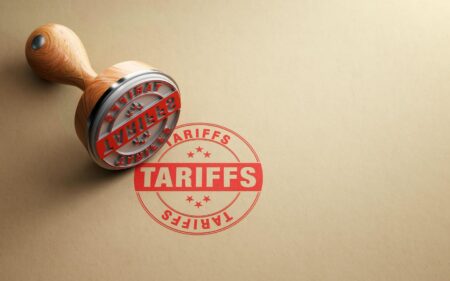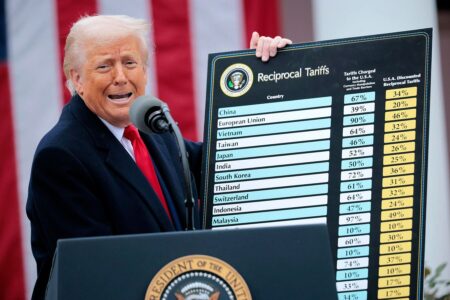Tariffs aren’t just for steel and soybeans anymore. As we brace for another wave of “America First” politics, fintech could be the next big casualty, or perhaps beneficiary, of Donald Trump’s hardline and confusing stance on global trade.
When tariffs slam one sector, the repercussions can ricochet through others in unexpected ways. For fintechs, whose bread and butter often relies on borderless transactions and global talent, any escalation in tariffs might prove more destructive than many industry insiders want to admit. Here’s why.
Cross-Border Payments Could Take a Hit
Fintech thrives on frictionless borders, and cross-border payments are a core revenue stream for countless startups and unicorns alike. But what happens when Trump’s trade war spooks businesses into slashing international orders or rerouting supply chains? Transactions dwindle, liquidity shrinks, and remittance-dependent fintech platforms suddenly face a revenue drought. Sure, some might pivot to less-tapped corridors, but global realignments don’t happen overnight. By the time the dust settles, we might see entire corridors dominated by a handful of hyper-local players, and the rest locked out.
Supply Chain Fintech Sees Its Models Collapse
Supply chain finance solutions are built on predictable trade flows and stable cross-border partnerships. Tariffs detonate that predictability. When importers scramble to replace a blacklisted Chinese supplier with a Vietnamese one, or reroute goods through new ports, the underlying data that powers invoice factoring and risk scoring can go haywire. Fintechs that can’t adapt in real time could be stuck holding the bag, or, worse, pushing their clients into predatory lending rates just to hedge new risks. Tariffs might theoretically “protect” American businesses, but they could also create a labyrinth of higher costs and unpredictable supply lines that undermine the data-driven foundation of fintech lenders.
Talent Wars: Fewer Visas, Fewer Innovators
It’s no secret that fintech depends on brainpower just as much as capital. Yet, if Trump’s brand of hawkish immigration policy resurfaces, it’s not just H-1B hopefuls who suffer, companies starve for the top-tier engineering and data science talent that drives innovation. Imagine a scenario where the brightest blockchain developers or AI specialists can’t secure visas to join U.S. startups. They’ll head to Singapore, London, or Berlin instead. Over time, we risk becoming a second-tier fintech hub, hobbled by our own policies even if we dominate in sheer capital.
Regulatory Retaliation: Bigger Than You Think
A tariff war isn’t a one-way street. Countries slapped with new U.S. duties frequently retaliate, and financial services often become a favored battleground. Think extra red tape for U.S. fintechs operating overseas, or even outright bans on certain digital payment solutions. If that sounds far-fetched, consider that China, Europe, and parts of Asia have all toyed with restricting access for foreign financial institutions in the past. With the global regulatory environment in flux, a fresh wave of “us vs. them” measures could slam American fintechs far harder than anyone anticipates.
Could Some Fintechs Actually Benefit?
As shocking as it may sound, not every fintech is dreading a tariff showdown. Some see opportunity in the chaos. For instance, if U.S. companies are forced to localize supply chains, smaller fintechs specializing in domestic e-commerce lending or B2B payments could see a windfall. The surge in “onshoring” might also drive new demand for real-time payment tools and streamlined credit solutions, perfect territory for nimble, niche players. It’s a classic Darwinian scenario: adapt fast or risk extinction.
The Ugly Truth: Uncertainty Is Kryptonite
While pundits debate the upsides of tariffs for traditional industries, the fintech sector thrives on continuity and predictable regulations. Uncertainty is the real threat, a whiplash of sudden tariffs, retaliatory policies, and shifting trade alliances can sabotage even the best-laid strategic plans. Venture capitalists might pull back on funding amid the unpredictability, leaving promising startups starved for investment. Larger incumbents might shelve expansion plans. And consumers, faced with rising costs and fewer cross-border options, could retreat to traditional banks, ironic, given fintech’s promise of cost savings and efficiency.
Conclusion: High Stakes for a Rapidly Evolving Industry
For all the talk about bringing manufacturing back and leveling trade imbalances, a hardline tariff approach could dramatically reshape the fintech landscape—potentially crippling the cross-border ethos that has fueled the sector’s meteoric rise. With immigration limits threatening talent pipelines, regulatory retaliation looming overseas, and new trade corridors emerging from the chaos, the stakes are higher than many are willing to admit. Some agile fintechs may adapt and thrive, capturing new domestic markets or tailoring solutions for emerging corridors. But for others, a renewed Trump-era tariff war could be a one-way ticket to stagnation, or an early exit.
In other words, “America First” might translate to fintech second-guessing its global ambitions, just at a moment when digital finance is on the cusp of reshaping the global economy. That tension, between an administration’s tariffs and an industry built on global connectivity, makes the next few years in fintech some of the most uncertain yet. If you’re not preparing a Plan B (or C, or D), you could be in for a rude awakening when the tariff drums start pounding again.
Read the full article here











